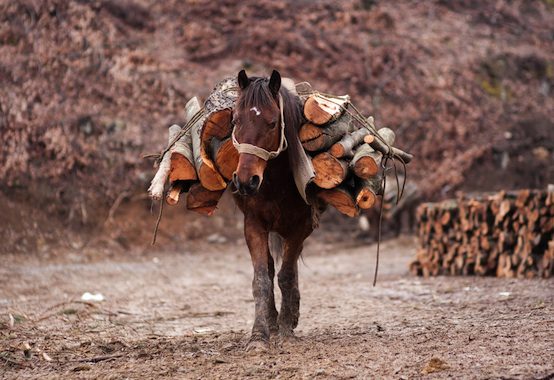A Long, Cold Lent: David Adams Richards’s Friends of Meager Fortune

I saved The Friends of Meager Fortune, the second novel I’ve read by Canadian Catholic author David Adams Richards, for the polar vortex. If anything can make Boston in January seem warm, it’s this relentlessly grim tale of the last days of man-and-horse lumbering, with horses crashing through the ice and bloodied hands freezing on the reins.
I’m conflicted about recommending the book. What is good in it is immensely powerful. The story of the doomed love of local failure/hero/failure again Owen Johnson and charity case/outcast Camellia Dupuis is suspenseful and deeply moving. Camellia is a luminous innocent who never becomes cloying. She’s gentle, in a profoundly ungentle world.
Even more moving, though, is the portrayal of the grim, death-shadowed men who work for Owen up on Good Friday Mountain, cutting down logs under shockingly dangerous and miserable conditions. The book would be worth reading just for the depictions of the horses, their pride and suffering, as they work themselves to death under the care of proud and suffering men. The economic suspense (will Johnson’s timber haul fail?) and the suspense of the work itself (who will survive the grim conditions on Good Friday?) are as tense as the romance, and the plot twists in these areas made me gasp several times.
And Richards acidly depicts the gossip and judgment of a small town, the way the gazes of our neighbors can destroy us.
On the other hand… well, I unfairly summarized one aspect of the novel as, “It’s three hundred-some pages of a depressed Canadian scolding me for not being poor.” The narrative voice is plangent and moralizing to the point that I started wanting to cross stuff out or write Too much! in the margins. Great men are destroyed by lesser men; every motive is spelled out for us. “She was using her power in [the labor] union to control the destiny of poor, half-illiterate men.” Yes, we know.
Toward the end of the novel you find out who the unnamed narrator is: he’s intimately related to the events he has been recounting. And the narrative voice does have that familial rhythm, Grandpa telling teaching stories to the children on a long winter night, his voice rising in unforgotten anguish or outrage and then falling back into nostalgia. I think the identity of the narrator and his relationship to this vanished economic world complicates the table-pounding insistence on dividing the town (and the world, where the sacrifices of mercilessly overworked men and horses are ignored when they’re not mocked) into heroes and villains. Nonetheless, there is just too much banging on.
The Friends of Meager Fortune is a tough novel, and its problems seem to me to be deliberate choices. I don’t get the impression that Richards couldn’t keep his material under his hand. The book requires patience, but it does reward it.
Comments